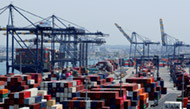The Vietnamese Are Discovering the Downside of Free Markets

Vietnamese who make ritual offerings to their ancestors are worried about the rising cost of the goods they burn.
By SETH MYDANSHANOI, Vietnam - Even the ghosts are suffering from inflation in Vietnam this year.
August is the month when Buddhists ply the hungry ghosts of the dead with food and wine and cigarettes, and honor them with paper offerings that represent the good things in life: cars, houses, motorbikes, stereo sets, fancy suits.
But like everything else in Vietnam, these brightly colored offerings have risen steeply in price, and shopkeepers say people are buying fewer gifts to burn for the dead.
With inflation rising to 27 percent in July - the highest in Asia - and food prices 74 percent above those a year ago, Vietnam is suffering its first serious downturn since it moved from a command economy to an open market nearly two decades ago.
In July the government raised the price of gasoline by 31 percent to an all-time high of 19,000 dong ($1.19) per liter. Diesel and kerosene prices rose still higher. The country’s fledgling stock market, which had been booming a year ago, has fallen in volume by 95 percent and is at a virtual standstill.
Squeezed on all sides, people are cutting back on food, limiting travel, looking for second jobs, delaying major purchases and waiting for the cost of a wedding to go down before marrying.
Some village women who traveled to Hanoi to sell special homemade candies for the hungry ghost festival say they have not earned enough this year to return home.
Given this slowdown, Vietnam, which had been growing by about 8 percent a year for the past decade, is scaling back its plans for growth and economic development.
In July the Asian Development Bank forecast that growth would slow to 6.5 percent this year. Some economists say even that figure is probably too high. Trade and current-account deficits have widened.
The mood in Vietnam, after years of upward mobility, is tense, said Kim N. B. Ninh, the Asia Foundation’s country representative.
“I think people are pessimistic,” she said. “You sense a tougher environment, a more restricted environment, a more pessimistic environment. It’s a moment of turmoil, I think.”
In part, economists say, Vietnam is suffering from the worldwide economic downturn and from high inflation that has spread through Southeast Asia.
But they say the problems are also self-inflicted, the result of an overheated economy as Vietnam raced forward with inadequate safeguards. Too much capital, particularly from foreign investment, has collided with bottlenecks in infrastructure and capacity.
The education system, meanwhile, has produced too few skilled and semiskilled workers for Vietnam to move up quickly into more complex manufacturing industries.
Hundreds of strikes at the factories that have been engines of Vietnam’s growth are some of the sharpest signs of discontent. Some of the factory workers who are leading Vietnam’s rise from poverty are returning to the countryside, according to the local press, unable to sustain an urban life on a factory wage.
After a steep reduction in the poverty rate from 58 percent of the population in 1993 to around 15 percent last year, some people - including those who had bought their first motorbike or cellphone - are slipping back below the poverty line.
A shoeshine has gone up to 25 cents from 19 cents; a good haircut to $1.87 from $1.25; a tiny cup of tea on the street to 6 cents from 3 cents; a massage to $6.25 from $4.37.
In the long term, most economists agree, Vietnam will continue the transformation it began in the early 1990s with a new policy of economic restructuring called “doi moi” decreed in 1986.
Private enterprise was encouraged, agriculture was freed from government controls, hyperinflation was tamed and Vietnam became, like China, a largely capitalist nation under the control of a Communist government.
In the past, when strict Communism ruled, religion was banned. It returned along with commerce. The two have flourished in tandem, and now they are feeling the pinch of inflation together.
“It’s terrible right now,” said Dinh Vu Hung, 54, who sells paper offerings for the dead in the Ancient Quarter of Hanoi.
“We make these beautiful things, but the prices have gone up and fewer people are buying them. It’s not just us, though. It’s the whole country.”
스마터리빙
more [ 건강]
[ 건강]이제 혈관 건강도 챙기자!
[현대해운]우리 눈에 보이지 않기 때문에 혈관 건강을 챙기는 것은 결코 쉽지 않은데요. 여러분은 혈관 건강을 유지하기 위해 어떤 노력을 하시나요?
 [ 건강]
[ 건강]내 몸이 건강해지는 과일궁합
 [ 라이프]
[ 라이프]벌레야 물럿거라! 천연 해충제 만들기
 [ 건강]
[ 건강]혈압 낮추는데 좋은 식품
[현대해운]혈관 건강은 주로 노화가 진행되면서 지켜야 할 문제라고 인식되어 왔습니다. 최근 생활 패턴과 식생활의 변화로 혈관의 노화 진행이 빨라지고
사람·사람들
more많이 본 기사
- [‘로드 레이지’ 한인 피살 현장 상세 상황] 끼어들기 시비가 비극으로… 차에서 내려 “쏴봐라” 언쟁
- 크리스마스 대형 폭풍… 침수·산사태 대비 ‘비상’
- [이민 단속] 새해에도 더 공격적 단속
- 취업비자(H-1B), 고연봉자 우선 발급
- 연방대법, 시카고 주방위군 투입 ‘기각’
- [성탄절 문 여는 곳은] 코스코·월마트 닫고… CVS는 영업
- 가난해서 흙 팠는데… ‘다이아’ 캤다
- [이민 단속] 여권 소지 시민권자들 증가
- 지평 넓히는 K-푸드… 라면·김치 이어 과자·스낵 가세
- 불체자 자진출국하면 지원금 3배로 ‘3천불’
- “샌디에고와 100점짜리 계약 체결… 마차도와 호흡 기대”
- “트럼프 정부, 망명신청자 8천명 과테말라 등 제3국 추방 추진”
- 한국계 타자 레프스나이더 시애틀과 625만달러 1년 계약
- 차기 대선 선호도… 공화 ‘밴스’ ·민주 ‘뉴섬’ 선두
- 온라인쇼핑과 반품, 그리고 그 이후
- 엡스타인 자료 추가 공개… “전용기에 트럼프 8번 타”
- 두 손 모아 성탄기도… “온 세상에 평화를”
- 내란재판부 설치법 이어 허위조작정보근절법도 국회 본회의 통과
- [남가주 6개 은행 전국 예금 현황] 1억달러 이상 예금고 지점 99개
- MC몽, 차가원 회장 충격 불륜 부인.. “채무 120억 당연히 이행”
- ‘계엄연루’ 추경호 첫재판…특검 “국민관심 커 신속재판해야”
- 금값, 1979년 이후 최대 연간 상승
- 미, 외국산 드론·부품 수입 전면 금지
- ‘파워볼’ 열풍 계속… 오늘 잭팟상금 17억 달러
- ‘100억달러 수주’ 한화오션, 내년 FPSO 시장 노린다
- [송년 행사] KAMA USA 실버모델협회
- [미국은 지금] MAGA의 분열, 예견된 균열의 시작
- 트럼프의 새 독트린 “미국을 다시 왜소하게”
- 뉴올리언스, 5연승 내달리며 부활 신호탄… 윌리엄슨 24점
- [송년 행사] 이경원 리더십센터
- 먹는 비만약 경쟁 치열 ‘위고비’ 미국 판매승인
- 정동원, 내년 2월 23일 해병대 입대..전역 예정일은 27년 8월 22일
- [수요 에세이] 삶이라는 배를 타고
- [지평선] ‘인간GPT’ 환각의 부작용
- 한국외대, ‘김재한 강의실’ 헌정식
- “국악 아름다움 나눠요”
- ‘글루텐 불내증’ 셰프가 빵집을? 고객 향한 온기 담은 바게트
- 트럼프 “마두로 물러나라” 최후통첩
- 12월 소비자 신뢰지수 소폭 하락
- HD현대중공업, 페루형 잠수함 공동 개발
- ‘평양무인기’ 김용현·여인형 추가 구속…법원 “증거인멸 염려”
- 발렌시아 한국학교 한국어 스펠링비 성료
- 위성락 “’핵잠’ 韓美협정 추진키로 … 1
- [서울 N 스피릿츠 바베큐] “진짜 제대로 된 영양 짬뽕 한 그릇”
- 미 해군 군함 명칭 전통 깬 ‘트럼프급 전함’
- 미국 경제, 3분기 4.3% ‘깜짝 성장’
- “은·로빈후드·인공지능 주식에 집중 투자”
- ‘세계한인대회’ 신설한다 한인회·한상·차세대 포괄
- 오픈AI, 소셜앱 출시 AI로 영상 생성·공유
- [송년 행사] 글로벌어린이재단
1/5지식톡

-
 미 육군 사관학교 West Poin…
0
미 육군 사관학교 West Poin…
0https://youtu.be/SxD8cEhNV6Q연락처:wpkapca@gmail.comJohn Choi: 714-716-6414West Point 합격증을 받으셨나요?미 육군사관학교 West Point 학부모 모…
-
 ☝️해외에서도 가능한 한국어 선생님…
0
☝️해외에서도 가능한 한국어 선생님…
0이 영상 하나면 충분합니다!♥️상담신청문의♥️☝️ 문의 폭주로 '선착순 상담'만 진행합니다.☎️ : 02-6213-9094✨카카오톡ID : @GOODEDU77 (@골뱅이 꼭 붙여주셔야합니다…
-
 테슬라 자동차 시트커버 장착
0
테슬라 자동차 시트커버 장착
0테슬라 시트커버, 사놓고 아직 못 씌우셨죠?장착이 생각보다 쉽지 않습니다.20년 경력 전문가에게 맡기세요 — 깔끔하고 딱 맞게 장착해드립니다!장착비용:앞좌석: $40뒷좌석: $60앞·뒷좌석 …
-
 식당용 부탄가스
0
식당용 부탄가스
0식당용 부탄가스 홀세일 합니다 로스앤젤레스 다운타운 픽업 가능 안녕 하세요?강아지 & 고양이 모든 애완동물 / 반려동물 식품 & 모든 애완동물/반려동물 관련 제품들 전문적으로 홀세일/취급하는 회사 입니다 100% …
-
 ACSL 국제 컴퓨터 과학 대회, …
0
ACSL 국제 컴퓨터 과학 대회, …
0웹사이트 : www.eduspot.co.kr 카카오톡 상담하기 : https://pf.kakao.com/_BEQWxb블로그 : https://blog.naver.com/eduspotmain안녕하세요, 에듀스팟입니다…
케이타운 1번가
오피니언
 정숙희 논설위원
정숙희 논설위원온라인쇼핑과 반품, 그리고 그 이후
 파리드 자카리아 / 워싱턴포스트 칼럼니스트 / CNN ‘GPS’ 호스트
파리드 자카리아 / 워싱턴포스트 칼럼니스트 / CNN ‘GPS’ 호스트 트럼프의 새 독트린 “미국을 다시 왜소하게”
 김동찬 시민참여센터 대표
김동찬 시민참여센터 대표 [미국은 지금] MAGA의 분열, 예견된 균열의 시작
 임지영 (주)즐거운 예감 한점 갤러리 대표
임지영 (주)즐거운 예감 한점 갤러리 대표 [수요 에세이] 삶이라는 배를 타고
 이영창 / 한국일보 기자
이영창 / 한국일보 기자[지평선] ‘인간GPT’ 환각의 부작용
 조환동 / 편집기획국장·경제부장
조환동 / 편집기획국장·경제부장 AI로 가속화되는 노동시장 개편
 민경훈 논설위원
민경훈 논설위원‘크리스마스 캐롤’과 산타 클로스
 정재민 KAIST 문술미래전략 대학원 교수
정재민 KAIST 문술미래전략 대학원 교수 [정재민의 미디어풍경] 적과의 동침, 협력하며 경쟁하기
 김영화 수필가
김영화 수필가 [화요칼럼] 단호박의 온기
1/3지사별 뉴스

‘연방하원 도전장’ 척 박 예비후보 후원모임
연방하원에 도전장을 낸 척 박(한국명 박영철) 예비후보 후원 모임이 지난 18일 열렸다. 척 박의 부친인 박윤용 뉴욕주하원 25선거구 (민주)…
‘경찰 무력사용지침 갱신 의무화’ 입법 초읽기

‘올해는 ICE 이민자 체포 광풍의 해’
올 한해동안 버지니아와 메릴랜드, DC 등에서 연방 이민당국에 체포된 사람이 1만명이 훌쩍 넘는 것으로 조사됐다. 또 미 전국적으로는 22만명…
“ATM기 사용하기 겁나네”

연말 ‘로드레이지’ 비극… 한인 총격 피살
연말을 맞아 도로 위에서 순간적으로 벌어진 운전 중 시비가 40대 한인 가장의 총격 피살 비극으로 이어졌다. 워싱턴주 레이시 경찰국과 서스턴 …
엡스타인 파일 공개 다음날 트럼프 사진 삭제…야당서 탄핵 경고

오늘 하루 이 창 열지 않음 닫기 





















































.png)


댓글 안에 당신의 성숙함도 담아 주세요.
'오늘의 한마디'는 기사에 대하여 자신의 생각을 말하고 남의 생각을 들으며 서로 다양한 의견을 나누는 공간입니다. 그러나 간혹 불건전한 내용을 올리시는 분들이 계셔서 건전한 인터넷문화 정착을 위해 아래와 같은 운영원칙을 적용합니다.
자체 모니터링을 통해 아래에 해당하는 내용이 포함된 댓글이 발견되면 예고없이 삭제 조치를 하겠습니다.
불건전한 댓글을 올리거나, 이름에 비속어 및 상대방의 불쾌감을 주는 단어를 사용, 유명인 또는 특정 일반인을 사칭하는 경우 이용에 대한 차단 제재를 받을 수 있습니다. 차단될 경우, 일주일간 댓글을 달수 없게 됩니다.
명예훼손, 개인정보 유출, 욕설 등 법률에 위반되는 댓글은 관계 법령에 의거 민형사상 처벌을 받을 수 있으니 이용에 주의를 부탁드립니다.
Close
x